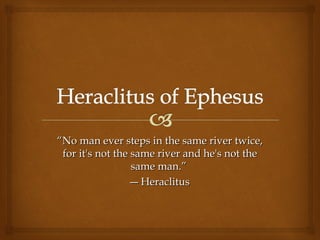
Heraclitus
- 1. ““No man ever steps in the same river twice,No man ever steps in the same river twice, for it's not the same river and he's not thefor it's not the same river and he's not the same man.same man.”” ―― HeraclitusHeraclitus
- 2. Life of Heraclitus Heraclitus (late 6th century BC) was a pre-Socratic Greek philosopher, a native of Ephesus, an important city on the Ionian coast of Asia Minor, not far from Miletus, the birthplace of philosophy.
- 3. We know nothing about his life other than what can be gleaned from his own statements, he regarded himself as self- taught and a pioneer of wisdom; for all ancient biographies of him consist of nothing more than inferences or imaginary constructions based on his sayings. Life of Heraclitus
- 4. Life of Heraclitus From the lonely life he led, and still more from the apparently riddled and allegedly paradoxical nature of his philosophy and his stress upon the needless unconsciousness of humankind, he was called "The Obscure" and the "Weeping Philosopher".
- 5. Heraclitus appears to have written only one book, entitled On Nature. Diogenes states that Heraclitus' work was "a continuous treatise On Nature, but was divided into three discourses, one on the universe, another on politics, and a third on theology.” Theophrastus says (in Diogenes) "...some parts of his work [are] half-finished, while other parts [made] a strange medley. On Nature
- 6. On Nature The complete text of Heraclitus' book has been lost; however, since he was frequently quoted by other ancient philosophers, there are about 130 fragments of writing attributed to him. Unfortunately, more than one-half of these fragments have been challenged as to their authenticity by various scholars at various times. This leaves only about 60 fragments which are accepted as genuine by all classical academics.
- 7. According to both Plato and Aristotle , Heraclitus held extreme views that led to logical incoherence. For he held that everything is constantly changing opposite things are identical everything is and is not at the same time. The Doctrine of Flux and the Unity of Opposites
- 8. Logos The writing of Heraclitus was the first place where the word logos was given special attention in ancient Greek philosophy.
- 9. Heraclitus argued that there was an objective truth about everything, an underlying current flowing across a time, and on to the next one. This constancy he called Logos. Logos, for Heraclitus, was the world’s rationale, its determining formula, the truth, and thus the key to everythings nature. Heraclitus, therefore, was understandably opposed to the naïve empiricism of his time, and pleaded that men come to discover the ‘depth of the soul’s own logos’. Logos
- 10. Arche - Fire Fire, for Heraclitus the primordial element arche. From fire all things originate, and return to it again in a process of eternal cycles. He believed fire gave rise to the other elements. He regarded the soul as being a mixture of fire and water, with fire being the noble part of the soul, and water the ignoble part.
- 11. This Cosmos [the same of all] did none of gods or men make. But it always was, and is, and shall be an ever-living Fire, kindling in measures and going out in measures. This passage contains the earliest extant philosophical use of the word kosmos denoting the organized world in which we live, with earth, sea, atmosphere, and heavens. Physical Theory
- 12. Heraclitus' criticisms and metaphysical speculations are grounded in a physical theory. He explains the order and proportion in which the stuffs change: The turnings of fire: first sea, and of sea, half is earth, half firewind Fire is transformed into water ("sea") of which half turns back into fire ("firewind") and half into earth. Thus there is a sequence of stuffs: fire, water, earth, which are interconnected Physical Theory
- 13. When earth turns back into sea, it occupies the same volume as it had before it turned into earth. Thus we can recognize a primitive law of conservation-not precisely conservation of matter, at least the identity of the matter is not conserved, nor of mass, but at least an equivalence of matter is maintained. Although the fragments do not give detailed information about Heraclitus' physics, it seems likely that the amount of water that evaporates each day is balanced by the amount of stuff that precipitates as water, and so on, so that a balance of stuffs is maintained even though portions of stuff are constantly changing their identity. Physical Theory
- 14. I chose Heraclitus as a subject of my presentation because I find natural philosophers’ theories very engaging in general and Heraclitus’ theory of fire being ‘the beginning of everything’ caught my attention. In process I found out about his Doctrine of Flux which is a very interesting and unusual concept too and gives food for thought. Why Heraclitus?
- 15. THE END. THANK YOU FOR THEATTANTION